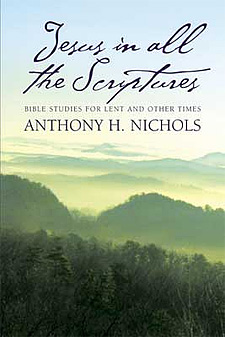"Jesus said to them, "O Foolish men, and slow of heart to believe all that the Prophets have spoken! Was it not necessary that the Christ should suffer these things and enter into His glory?' And beginning with Moses and the prophets he explained to them all the Scriptures the things concerning himself" (Luke 24:25-27)
 This passage, along with other verses alluding to the same idea is the basis for the series of studies which make up Tony Nichols' Jesus in all the Scriptures: Bible Studies for Lent and Other Times. As the books own introduction states, the purpose of these studies is to demonstrate that "" Jesus teaches that the whole Bible is about himself from beginning to end.'
This passage, along with other verses alluding to the same idea is the basis for the series of studies which make up Tony Nichols' Jesus in all the Scriptures: Bible Studies for Lent and Other Times. As the books own introduction states, the purpose of these studies is to demonstrate that "" Jesus teaches that the whole Bible is about himself from beginning to end.'
Each day's study includes a primary reading, sometimes with additional verses printed in the book; original notes by Nichols'; a "reflect and discuss' section, often with further verses upon which to reflect; and concludes with an eloquently worded prayer, which usually relates back to the reading.
Surely one needs a taste of the resource, to get an idea of its usefulness though. Rather than copying a study verbatim, I thought a couple of fabricated diary entries mightn't go astray:
Day 8 " Reading today was from Genesis 49 & 50; about Joseph. Love Genesis 50:20. God does indeed bring good from the actions of sinful men. Interesting to see the different fulfilments of Joseph's prophecy, "God will surely visit you…' (Gen 50:24, ESV).
Day 23 " Reading today was Jeremiah 23; about godlessness in Judah's "shepherds'. Good point made about the idea of "shepherds' and "sheep' in scripture. Fascinating to note that the wise king God promised to raise was to be named "The Lord our Righteousness'.
Day 37 " Today's reading was Matthew 16:13-28; about Jesus' challenging his disciples, "Who do you say that I am?' Passage shows the importance of death in salvation: both Jesus' on the cross, and our own dying to sin & selfishness. This is the fulfilment of many OT prophecies.
Including these examples, studies are drawn from twelve Old Testaments books as well as the four Gospels. Whilst these studies would make a great series for the Lenten period leading up to Easter, particularly given that the last studies' focus on the Crucifixion and its importance, there are a far broader range of uses that these studies would be most helpful for. With a little work this book would be fantastic to use in preparing candidates for baptism, or confirmation, or just to try and round-out your own, or others', exposure to and understanding of themes from the Old Testament, and their fulfilment in our Christ.





















